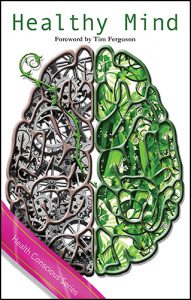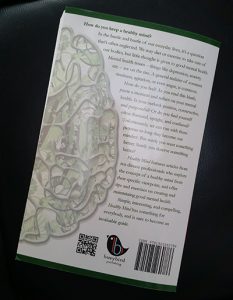

Blog
Welcome to the Busybird blog, where you can find helpful articles, updates, industry news and more. Make sure you stay up to date by signing up to our newsletter below.
Healthy Body
May 12, 2016 The Health Conscious Series was the brainchild of Blaise van Hecke, Busybird’s director of publishing, and also popularly known as The Book Chick.
The Health Conscious Series was the brainchild of Blaise van Hecke, Busybird’s director of publishing, and also popularly known as The Book Chick.
The first book in the series, Healthy Mind, featured ten articles from non-competing professionals (e.g. a psychologist, a kinesiologist, a psychotherapist) about practices to keep a healthy mind, each speaking from their own area of expertise. The foreword was written by comedian and actor, Tim Ferguson, who recently disclosed that he has MS.
Something we found as we poured through the Healthy Mind submissions was that some of the pieces overlapped into other areas, i.e. they also became about healthy body, and/or healthy spirit. This shows how intertwined health is.
In pain seminars, they teach the value of context in the way your mind processes pain, and how your body handles that pain. If, for example, you suffer from chronic pain, you might be less likely to notice it, or let it affect you, when you’re on holiday having a good time, compared to if you were working 9–5 in some dreary job. The context changes, so your mind interprets the pain differently, which reflects how much it affects us physically, and then mentally. Then it becomes a vicious cycle: you notice it, it feels worse, and because it feels worse, you notice it more, and on and on it goes.
Conversely, pain affects mood. Anybody who’s ever had a toothache can attest to that. We might be in the greatest of moods, yet wake up the next day with a toothache that drags us down so we’re miserable. People who live with chronic pain often struggle to not only deal with pain, but also navigate everyday life, and duties that they once might’ve taken for granted. Just ask anybody with chronic back problems how they have to deal with picking up their kids, or stooping to do some gardening – things they would’ve once done unthinkingly. These newfound restrictions – if handled incorrectly – remind people what they’ve lost, how labyrinthine their life has become in dealing with their pain, and can lead to issues such as depression, as well as perils (e.g. addiction) those issues invite.
Of course, not everybody has to deal with pain on such an extreme scale. Most of us are just exploring avenues to be as healthy as possible. People often find this increasingly becomes a query as they grow older, and their body struggles to do the things it once did with ease. Some just search for and trial any modalities that facilitate good health. Practices such as yoga and pilates have become more accepted in everyday life, as has the value of walking (how often do we hear about somebody’s ‘steps’?) or hitting the gym regularly, and there’s any number of wonder diets out there.
We’re always searching – for whatever reason – to make ourselves better.
 Now that we at Busybird have explored means of keeping a healthy mind, we’re now moving onto Healthy Body, with a range of non-competing professionals discussing how best to keep a healthy body. We’re sure again there’ll be some overlap because, as illustrated, every component of our health is so inextricably interlinked. But the focus will primarily be on the body.
Now that we at Busybird have explored means of keeping a healthy mind, we’re now moving onto Healthy Body, with a range of non-competing professionals discussing how best to keep a healthy body. We’re sure again there’ll be some overlap because, as illustrated, every component of our health is so inextricably interlinked. But the focus will primarily be on the body.
The foreword for ‘Healthy Body’ will be written by Carol Cooke, who was diagnosed with Multiple Sclerosis, and was told to go home and get her affairs in order before she became incapacitated. Instead, she became a Paralympian, and has won a swath of medals in various events all over the world, including Gold at the 2012 Paralympics in Mixed Time Trial T1–2 cycling event. Carol believes that nothing is impossible, and her greatest pleasure is doing – accomplishing – what other people saying she can’t. She now works as a motivational speaker. A dollar from the sale of every ‘Healthy Body’ will go to Go For Gold Scholarship.
‘Healthy Body’ is scheduled for an October launch. If you’d like to learn more about the Health Conscious Series or about contributing to ‘Healthy Body’, you can read about it here, give us a call to talk about it on (03) 9434 6365, or download the contributor’s guidelines here.
Karma Kinglake Writing Retreat
May 5, 2016 After driving through winding roads and wondering if you’re going the right way, you see it emerge from the gum trees: Karma Kinglake, a rustic house rebuilt from the ashes of Black Saturday. There’s an old-style charm about it, a character that welcomes you and tells you that you’re going to be in for something special this weekend.
After driving through winding roads and wondering if you’re going the right way, you see it emerge from the gum trees: Karma Kinglake, a rustic house rebuilt from the ashes of Black Saturday. There’s an old-style charm about it, a character that welcomes you and tells you that you’re going to be in for something special this weekend.
The first thing you notice as you get out of your car, the trees swaying around you in greeting, is the cold: it’s sharp and biting, but it’s also clean up here, away from the congestion and the pollution of the city. Then there’s the haunting beauty, this place that’s seen so much tragedy and sadness. And yet here it is, standing tall once again, sweeping and naturally beautiful, a testament to the indomitability of Mother Nature.
 You check in and meet Karen, one of your hosts at Karma Kinglake. She’s charming and poetically eloquent as she greets you, and shows you where you’ll be staying. You bring your bags in and absorb your surroundings, thinking about how this is where you’ll be sleeping the next two nights.
You check in and meet Karen, one of your hosts at Karma Kinglake. She’s charming and poetically eloquent as she greets you, and shows you where you’ll be staying. You bring your bags in and absorb your surroundings, thinking about how this is where you’ll be sleeping the next two nights.
From there it’s into the lounge to meet the other participants, as well as your facilitators: Blaise and Les.
Blaise van Hecke – the director of Publishing at Busybird Publishing, and President of the Society of Women Writers – is a writer at heart, and last year finished her novel, ‘The Colours of Ash’, a story about a young couple trying to rebuild their relationship following a tragedy, and in the face of nature’s fury. She’s been busily revising this year, whilst also working on a memoir about her unusual childhood, growing up on a commune. Les Zigomanis is an award-winning writer and the chief editor at Busybird Publishing. His memoir, ‘Overload’, was short-listed for the Finch Prize in 2012. Les knows about structure in story – having written several novels – so you’re in the best of hands.
 Once the introductions are out of the way, there’s talk about what you’re working on, followed by a dinner Karen has painstakingly prepared (all dietary requirements have been catered for), followed by casual discussion in the lounge, by the warmth of the crackling fire.
Once the introductions are out of the way, there’s talk about what you’re working on, followed by a dinner Karen has painstakingly prepared (all dietary requirements have been catered for), followed by casual discussion in the lounge, by the warmth of the crackling fire.
In the evening, there’s an optional meditation session to set you up for writing over the weekend, before retreating to your room, snuggling into the cosiness of your bed as the wind howls outside, whipping through trees that rustle like they might be shivering. You’re glad you’re in here, warm and safe, and look forward to what the next day might bring.
The birds wake you in the morning, so free and unbridled. They speak of the unlimited potential wrapped up in today. You get out of bed to find Blaise already up, bright and full of energy, hosting an optional session in yoga or meditation, or – depending on the weather – a walk through the surrounds. Then it’s time for breakfast in your room where Karen has set everything ready.
 Up into the conference room after breakfast, where Blaise and Les begin the first workshop, an introduction exploring why we write, and the story we want to tell. Whilst you have a general idea about what you want to do, sometimes those ideas are not wholly formed, so it helps to articulate them. Following a short break with a cuppa, it’s off to the next session, which looks at good writing practices and writing authentically. Now, those amorphous ideas take shape, and you grow excited about where your project could go.
Up into the conference room after breakfast, where Blaise and Les begin the first workshop, an introduction exploring why we write, and the story we want to tell. Whilst you have a general idea about what you want to do, sometimes those ideas are not wholly formed, so it helps to articulate them. Following a short break with a cuppa, it’s off to the next session, which looks at good writing practices and writing authentically. Now, those amorphous ideas take shape, and you grow excited about where your project could go.
After the busy morning, you go down and find Karen has a delicious lunch waiting, and everybody talks about what they’d like to do, what they want to write, their dreams of publication, and things they’ve enjoyed reading. It’s stimulating chatter over a hearty meal and you think this is what’s missing from your writing life – this interaction with like-minded people.
Then it’s right back into the workshops, one where you share an excerpt and the group talk about it. It’s an interesting exercise, and a first for you. You might’ve shared some of your writing with friends, but now you’ve exposed it to a greater audience. They like what you have to say, but they also have feedback. It’s great seeing how your writing connects with others. Over the next workshop you put your head down and commit to the writing exercises Blaise assigns – exercises that compel you to go deeper and consider the finer details.
 A bit of free time then, to reflect, before dinner, and then talk about what you’ve learned today, and how you’ll be able to incorporate it into your writing. There’s a lot to think about. A lot. And there’s a lot to digest. But as you dissimilate it, you see how you can apply it not just to the project you want to work on, but writing as a whole. Although this weekend is about life writing, it’s also about writing in general, and you’re learning so many new things.
A bit of free time then, to reflect, before dinner, and then talk about what you’ve learned today, and how you’ll be able to incorporate it into your writing. There’s a lot to think about. A lot. And there’s a lot to digest. But as you dissimilate it, you see how you can apply it not just to the project you want to work on, but writing as a whole. Although this weekend is about life writing, it’s also about writing in general, and you’re learning so many new things.
There’s an optional meditation session then, which helps you unwind, before bed, and you look forward to the next morning, but you also feel a hint of regret that already you’re coming to the last day. You drift off to the sound of the wind and the gums quivering, a lullaby that’s almost hypnotic.
In the morning, again there’s a yoga or a meditation session, or – if the weather permits – a walk through the gums. You marvel at the trees as you think that just seven years ago, Black Saturday razed this whole area, and you ponder at the tragic loss of life and property. But there’s hope here also, the promise of tomorrow interlaced with the relentlessness of the human spirit.
After breakfast, it’s right back into another workshop, which looks at revision and editing, and how to polish your work. There are lots of things to consider now – things you had never known existed. Then, following a short break, it’s a final session that looks at where you can submit, and your publishing options as a whole. You’re brimming with excitement now and can’t wait to get finished so you can share your story with the world.
A final lunch, and now the melancholy hits – the weekend is over. Over a wrap up, everybody talks about how they’re going to tackle their writing once they get back, and what they’re going to do once they’re finished. It’s all so exciting, and the weekend has bonded you to the others and you wish them the best, want to see their stories out in the world … right amongst yours.
You check out from Karma, and glance back once at the Retreat, now indelibly imprinted on your memories, before you get in your car and drive back into the real world.
More details on our Karma Kinglake Writing Retreat can be found here.
More details on our Karma Kinglake can be found here.
Call (03) 9434 6365 or email us here with any queries.
Having Played My Part
April 27, 2016 I’ve been the head editor of page seventeen since it came to Busybird in 2011. Since that time we’ve released four books across five years – all exhibiting work from emerging writers and first-timers with something to say.
I’ve been the head editor of page seventeen since it came to Busybird in 2011. Since that time we’ve released four books across five years – all exhibiting work from emerging writers and first-timers with something to say.
They’ve been wildly diverse collections. Rarely have we published the same author twice. Rarely have we sunk deep into a single genre or theme.
I’ve had different reactions of pride to every issue – the exuberance of #09, the cheekiness of #10, the shining assertiveness of #11, the cavalier confidence of #12. It’s been hard and even frustrating at times getting every issue sorted. But I love them all, and I’ve loved having the opportunity to play such a large part in putting them together.
And yet, here I am announcing that I am stepping away as head editor of page seventeen.
It has not been an easy decision to make, and one that I’ve been admittedly dragging my heels on. But when I can no longer promise putting in the same time and effort that I know P17 requires, I have to take that as a sign. And maybe P17 is due for some fresh changes, the kind that can benefit from a switch in management.
So although I’ll certainly miss running the submissions and going through all the content, I’m not as upset as I thought I would be. I’ll still be around, both as an editor for Busybird Publishing and reciting my clunky prose a little too fast at the Busybird Open Mic Nights. I’ll even continue to post on this blog here and there, just no longer as P17’s ‘figurehead’.
In regards to P17-based developments, keep watching this space (and the Facebook pages for both P17 and Busybird) for more updates.
To everyone who helped bring each issue together – readers, editors, judges, proofreaders – so many thanks are due. To the Busybird team in particular for being so supportive as I’ve stumbled my way along.
And there are so many writers and submitters out there who I’m indebted to for trusting us with their work. The stories, poems and articles we’ve published across these four issues of P17 are just tiny pieces of the massive jigsaw puzzle we’ve been working with. So many writers out there with so many ideas. P17 would be an empty shell without them. Thank you.
And to anyone who’s read the issues I’ve overseen, I hope you enjoyed them. I know I have.
Beau Hillier
The Importance of a Good Blurb
April 21, 2016 One of the most important features in writing today, especially in the digital era, is the blurb of a book. A blurb defines what the book is about in 200 words.
One of the most important features in writing today, especially in the digital era, is the blurb of a book. A blurb defines what the book is about in 200 words.
A good blurb is on par with a good cover image and both need to stand out.
The blurb has to be engaging. Not necessarily attractive like a European-man-with-long-luscious-hair-riding-on-a-horse-type-of-engaging, but it does need to convince the audience that this is one hell of a book.
You can do this by creating mystery, but the mystery can’t give the story away.
1. Choose an opening that introduces your main character(s) with originality and conflict.
‘When 16-year-old Katniss’s young sister, Prim, is selected as District 12’s female representative, Katniss volunteers to take her place.’
~ The Hunger Games, Suzanne Collins ~
2. Who are your characters and why do we care about them? Be interesting, make them three-dimensional.
‘As an adult, Theo moves silkily between the drawing rooms of the rich and the dusty labyrinth of an antiques store where he works. He is alienated and in love-and at the center of a narrowing, ever more dangerous circle.’
~ The Goldfinch, Donna Tartt ~
3. Be true about your story. Write in a way that tells the book honestly.
‘The Flamethrowers is an intensely engaging exploration of the mystique of the feminine, the fake, the terrorist.’
~ The Flamethrowers, Rachel Kushner ~
4. End the paragraph with a cliffhanger for readers to find the rest of the story themselves.
‘Lisbeth Salander – outcast … enigma … avenger…’
~ The Girl with the Dragon Tattoo, Stieg Larsson ~
If you’re still unsure how to go about creating a good blurb, here’s a formula that breaks down the whole step-by-step process of it all.
1. The opening, the conflict, and the character = A situation
Mathew Penn seems to have it all: friends, financial stability, loving family … He is the ‘perfect’ guy. But underneath all that charm lies a secret. A secret full of undeniable consequences could risk everything he’s ever worked for …
2. The situation + the three-dimensional character = a problem
Mathew has a dark impulse, an impulse that develops an ambition to trick his good intentions into doing evil things. On one hand he’s all smiles and unafraid to bring the ladies home – that is until the trickster comes out to play, and he is left feeling guilty and ashamed …
3. The Problem + a hopeful ending = an honest Reaction
As his virtue slumbers, so does his secret. Soon everyone in Mathew’s life becomes suspicious of his behaviour. While trying to uphold the forbidden truth from being foretold, Mathew must attempt to get his alter ego under control before it’s too late.
4. An honest Reaction + cliff-hanger = The final mood of ‘Oh Yeah’
A battle of life and death, but which side of Mathew will get the upper hand in order to keep or tell the unfettered secret that lies within?
5. Leads into describing what the book is about; the overall genre.
[Book Title] is a classic retelling of Dr Jekyll and Mr Hyde … A mystery filled with supernatural instincts that are bound to grip us to the core of who we are.
From these steps you’ll be able to create a good blurb in no time. Be intriguing and you and your book will go far.
Belle Savage
– Editorial Intern.
Troll
April 14, 2016 The internet is replete with keyboard warriors and trolls who hide behind anonymity to espouse inflammatory opinions, or to attack and deride others, whilst trying to promote themselves as some omniscient authority.
The internet is replete with keyboard warriors and trolls who hide behind anonymity to espouse inflammatory opinions, or to attack and deride others, whilst trying to promote themselves as some omniscient authority.
A few weeks ago, we ran a blog entitled ‘Always Be Hustling’, which looked at the need for authors to constantly get themselves out there to generate interest in their books. Somebody took offense and posted a smarmy response.
We responded to the comment at the time, but will do so again, breaking down the comment. Bear with us, because there is a point to this, and isn’t just a case of oneuptrollship.
- So, let me just work this out. You’re involved with a miniature publishing company that nobody has heard of …
Well, obviously they’ve heard of us, because they’re on our blog.
But this demonstrates the mindset of some people. Immediately, they attack. They’re not here for intelligent discussion, but to ridicule.
Busybird may be small, but we’re very proud of what we’ve done. We can only publish a handful of books yearly, but take great pride in each of them. We help authors self-publish, nurturing them through the experience, whilst also educating them on the realities of doing it themselves – not something many of our competitors do. We’re particularly proud of the creative hub we’ve created here in Montmorency.
- … and you’re regurgitating what has worked for people who have actually had to do all the difficult work, probably via blogs featuring this very same list a hundred times over?
This comment doesn’t make sense: you’re regurgitating what has worked for people who have actually had to do all the difficult work, probably via blogs …
What?
What?
Are they referring to the difficult work of promotion? But it’s difficult work of promotion … probably via blogs’? That’s what they’re saying – that this hard work has been expressed through blogs. Probably.
Let’s take the comment at face value and give the commenter the benefit of the doubt. Regurgitating? Um, no, we’ve actually had to do it ourselves. So we’ve learned this by doing.
- If someone has written a book worth selling, they’ve also probably got a deep understanding of their audience and a kind of savvy this columnist is no doubt lacking :’)
Quite possibly the funniest comment made. So, apparently, because you understand your audience, this translates to sales? Haha. The naivety behind this comment speaks of an inexperienced author, one who sits there thinking that whatever they’ve written is brilliant, and it’ll be a bestseller because, damnit, they know what they’re doing.
Understanding your audience and where you book sits in the market is important – there’s no denying that. But what makes your book stand out from the others which sit on the same shelf? From the other books released daily? Oh wait, because they’ve ‘got a deep understanding of their audience’? Hmmm. Okay. I must pass this information onto the big commercial publishers who perform market analyses, invest in PR, and yet can still struggle to sell books. Obviously, their understanding isn’t deep enough.
- A huge part of that is realising no audience appreciates being “hustled” and squawked at via social media …
Yes, the blog mentioned developing an online presence. But this comment implies the blog was exclusively about promoting via social media when, in fact, the blog looked at a few different avenues online, and quite a few avenues that had nothing to do with the internet. Social media was a tiny part of it.
- … and no one wants to read Yet Another Blog by a hopeful author.
Well, they read it.
- Also please get a better graphic designer for your book covers. Please.
And this idiot closes their comment the way they opened it – attacking. We’re very proud of our designer and all the graphic work at Busybird, but again, the commenter wants to try assert their dominance, like a dog pissing on a nature strip to mark its territory.
They also ignored the link we posted – Jennifer Byrne interviewing Bryce Courtenay, Matthew Reilly, Di Morrissey and Lee Child. These are four bestselling authors who’ve written for multinational publishers, and at the heart of their message was get yourself out there and sell yourself. Take every opportunity possible. Hopefully, the commenter has also emailed them and descried their message.
We don’t write blogs based on guesswork. Advice comes from experience. We don’t know it all (and have never professed to knowing it all), but we have learned a thing or two in our experiences.
We’re sure that somewhere else on the net, somebody’s said the same thing – that’s the basis of the internet. You will find a lot of people saying the same thing, just in different ways. But if one person has said something, does that mean it reaches everybody it needs to? Does that mean nobody else can write about that topic? Does that mean anybody else writing about that topic is of less value than other authors?
You’d have to be megalomaniacal to believe so.
But here’s the point: this blog isn’t just about cutting down some troll.
That’s just a bonus.
Working in any creative endeavour, you’ll have your critics. Some will be legitimate. Others will be trolls. The internet breeds them. They amble around, hurling their faeces at any place they believe it may stick. You just have to scan reviews on Goodreads or Amazon to see the way they thrive behind anonymity, trying to find value (and validation) in destroying others – probably simply to feel good about themselves, or because they have a misguided superiority about their own work.
Their responses aren’t a reflection of you or your work, but them, and the people they are.
Don’t ever let anybody like this get you down or have you questioning your work.
They don’t deserve your time.
And, having said that, we won’t spend another second on this one either.
